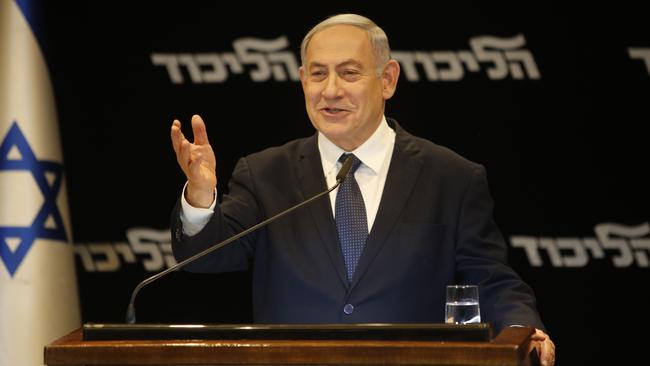Benjamin Netanyahu seeks immunity from corruption charges ahead of March election
The Israeli Prime Minister says his request for immunity from prosecution on corruption charges only covers his time in office.

Israeli Prime Minister Benjamin Netanyahu has asked the Knesset to grant him immunity from prosecution on corruption charges, ahead of a March election that will decide his future.
Mr Netanyahu was indicted in November on charges of bribery, fraud and breach of trust in connection with three corruption probes, becoming the first Israeli prime minister to be criminally charged while in office.
He sent an official request for immunity to Speaker of the Knesett on Wednesday night (Thursday AEDT). Mr Netanyahu said earlier that he would do so “in order to fulfil my right, my duty, and my mission to continue serving you, the citizens of Israel”.
“I will continue to lead Israel for many more years.” He emphasised that he wasn’t asking for perpetual immunity from the charges he faces, but only for the time he serves in office.
Mr Netanyahu’s legal troubles have contributed to an unprecedented period of political paralysis in Israel. Neither he nor his political rivals were able to form governments after back-to-back elections in April and September, with the country bitterly divided over whether Mr Netanyahu should continue to lead while facing allegations of corruption.
Mr Netanyahu has denied the charges, calling them a witch hunt. He has retained the support of his Likud party and other right-wing allies, winning a party leadership vote last week by a large margin.
With the Knesset disbanded and a caretaker government in power, the committee that would decide Mr Netanyahu’s request for immunity isn’t in session. The result is that his request will be in limbo until a new government is formed after the March 2 election, buying Mr Netanyahu time before legal proceedings against him can move forward.
His opponents accuse him of striving to stay in power at any cost — including dragging Israel into a new election cycle — in order to preside over a government that would be more likely to grant him immunity from prosecution.
Mr Netanyahu’s main rival, Blue and White party leader Benny Gantz, said the next election would decide the character of Israel as a state. “We can either have a statesmanlike unity government … or the kingdom of Netanyahu,” he said.
Potential kingmaker Avigdor Lieberman, the leader of Yisrael Beiteinu, said that his party would vote against the immunity request.
A poll published by Channel 12 on Sunday night found that a small majority of Israelis (51 per cent) oppose immunity for Mr Netanyahu, with 33 per cent supporting it and 16 per cent undecided.
On Sunday night, the Prime Minister defended his right to seek immunity. “Immunity isn’t against democracy; it’s a cornerstone of democracy,” he said.
As Israel’s longest-serving prime minister, Mr Netanyahu is hoping to succeed where other Israeli MPs have failed since 2005, after a legal amendment was passed to make it more difficult to get parliamentary immunity. Before the amendment, all MPs had immunity by default and could be stripped of it only by a vote in parliament. Since then, they need to ask parliament for immunity.
Numerous polls predict voter patterns are unlikely to shift in Israel’s third election in a year, leaving Mr Netanyahu and his allies short of the minimum 61 of 120 seats in the Knesset needed to form a governing coalition — and to grant him immunity.
If Mr Netanyahu does get his majority this could also set up a showdown between the Supreme Court and the Prime Minister.
The court could review parliament’s decision over immunity and overturn it, said Yohanan Plesner, president of the Israel Democracy Institute.
To ensure the court can’t intervene, Mr Plesner said, Mr Netanyahu could support a bill that curbs the court’s power to stop any legislation passed or administrative procedures carried out by parliament. “That would be a democratic bombshell,” he said.
Whether the court would intervene “is the million-dollar question”, said Abraham Diskin, a senior fellow with Jerusalem-based think tank the Kohelet Policy Forum.
Even without a formal request for immunity, Mr Netanyahu’s leadership was already facing a challenge in the Supreme Court. On Tuesday, the court began hearings over whether Mr Netanyahu can legally form a government while being under indictment. The judges suggested that they saw the discussion as premature unless Mr Netanyahu wins a mandate in an election.
The Wall Street Journal



To join the conversation, please log in. Don't have an account? Register
Join the conversation, you are commenting as Logout